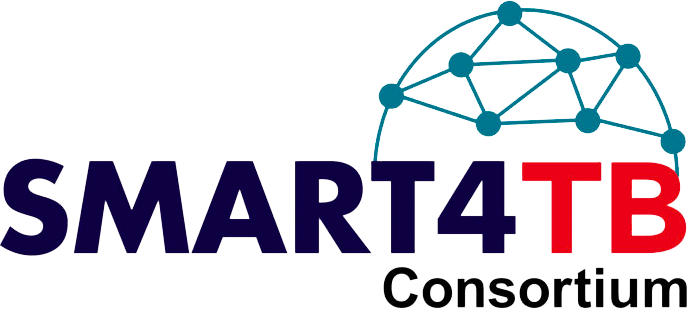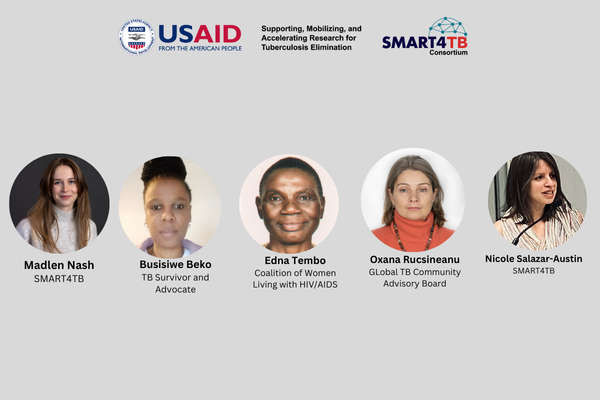Archives: SMART4TB Resources
SMART4TB Resources
ADAPT Study
SHERLOCK BIOSCIENCES JOINS SMART4TB DIAGNOSTIC PARTNERSHIP
Prioritizing scalable, point-of-care testing, five companies seek to produce the next major diagnostic advancement in TB
BALTIMORE, JULY 8, 2024 — Supporting, Mobilizing, and Accelerating Research for Tuberculosis Elimination (SMART4TB) is pleased to announce a collaboration with Sherlock Biosciences in developing their oral, swab-based point-of-care molecular test for TB. Sherlock joins the four companies, Boditech Med, Co-Diagnostics, Nuclein and Molbio Diagnostics, announced in January 2024 in receiving a first phase of SMART4TB funding and technical assistance to advance their novel tests with the hope of closing key TB diagnosis gaps. Among some of the traits that make Sherlock’s technology promising for TB diagnostics is ease of use, including the intended ability to self-collect the sample, and no need for extensive lab or storage infrastructure to complete the test. These features are especially important in reaching people in diverse, resource-limited healthcare settings where TB is often diagnosed.
Sherlock, and the previously announced developers, were selected by a panel of 11 TB and diagnostics experts from academic institutions and the United States Agency for International Development (USAID). Characteristics and data from this first phase will be evaluated by a similar group of experts, including affected community members, and those that meet key criteria will move into the next phase of funding to prepare for clinical assessment.
###
The SMART4TB Consortium brings together experts in TB tools development, implementation science, capacity strengthening, civil society engagement and policy translation. Led by Johns Hopkins University, consortium members include University of California, San Francisco, Elizabeth Glaser Pediatric AIDS Foundation, KNCV Tuberculosis Foundation, and Treatment Action Group. SMART4TB is made possible by the support of the American people through the United States Agency for International Development (USAID). The contents of this press release are the sole responsibility of SMART4TB and do not necessarily reflect the views of USAID, the United States Government or consortium collaborators or members.
OVERDUE: Including Pregnant Participants in Tuberculosis Research
New Cohorts of Global TB Investigators To Start Rigorous Research Leadership Program
Locally driven research is at the centerpiece of months-long USAID-funded program to continue building local capacity for tuberculosis research
BALTIMORE, April 25, 2024 — Supporting, Mobilizing, and Accelerating Research for Tuberculosis Elimination (SMART4TB) is excited to welcome the second cohort of Early Stage Investigator (ESI) scholars. This year’s cohort reflects the depth and diversity of early career researchers, with a total of 50 scholars representing six countries in Africa and Asia. Simultaneously, SMART4TB is admitting 12 scholars from the first cohort to Phase II of the ESI program, a rigorous fellowship that hones in on researchers’ specific projects.
“This year’s cohort of Early Stage Investigators were impressive, reflecting the diverse background and interests of global researchers,” said Robert Bollinger, the Raj and Kamla Gupta Professor of Infectious Diseases at Johns Hopkins University. “It’s incredibly gratifying to meet new scholars and progress some of the scholars we trained last year into the next phase and see their research interests mature and solidify.”
Now in its second year, the first phase of the Early Stage Investigator program, is a 10-week intensive curriculum delivered by some of the world’s leading TB researchers. Topics include developing a research question and concept paper for a research proposal, engaging communities, designing a research study as well as reviewing and discussing their country’s current National Tuberculosis Program priorities. The countries represented in this new cohort include Nigeria, the Philippines, South Africa, Uganda,Vietnam and Zambia.
This Early-Stage Investigators’ Program creates unique opportunities for further enhancing the quality of locally led research by bringing investigators into direct contact with top-notch knowledge sources in TB research and education,” said Degu Jerene, a senior epidemiologist and team lead at KNCV Tuberculosis Foundation. “The program builds on what countries have started, paving the way to a sustainable model of capacity strengthening.”
After successful completion of Phase I of the program, scholars can apply to Phase II where they progress to the SMART4TB fellowship program that includes specific courses to help convert their research concept into a fully developed high quality TB research proposal. They receive mentorship from both a local and an internationally experienced SMART4TB faculty research co-mentor. Fellows also have access to strategic technical support consultations, including data management, biostatistics, research ethics, study design, implementation science and community engagement from SMART4TB experts. This year’s SMART4TB Phase II fellowship participants represent Mozambique, the Philippines, South Africa, and Zambia.
Márcia Chiluvane, a SMART4TB fellow from Mozambique described her experience as an ESI scholar. “The highlight was developing a research proposal that can address the challenges highlighted by my country’s National Tuberculosis Program. On this journey, I was surrounded and supported by a remarkable network of colleagues and mentors, both national and international, with vast expertise in tuberculosis.”
“The Early Stage Investigator program really speaks to the need for comprehensive mentorship for researchers early in their careers,” said Philip Hopewell, professor of medicine emeritus at University of California, San Francisco. “The research and ideas they produce will undoubtedly inform the field and strengthen local capacity in sustainable ways that will benefit future generations.”
###
The SMART4TB Consortium brings together experts in TB tools development, implementation science, capacity strengthening, civil society engagement and policy translation. Led by Johns Hopkins University, consortium members include University of California, San Francisco, Elizabeth Glaser Pediatric AIDS Foundation, KNCV Tuberculosis Foundation, and Treatment Action Group.



